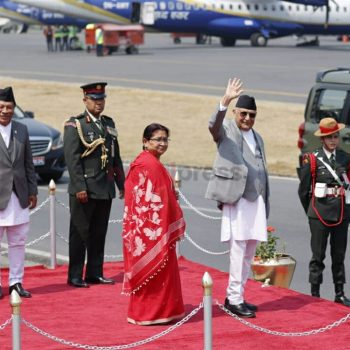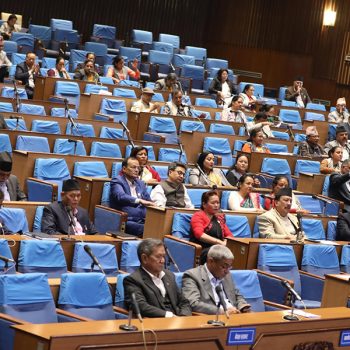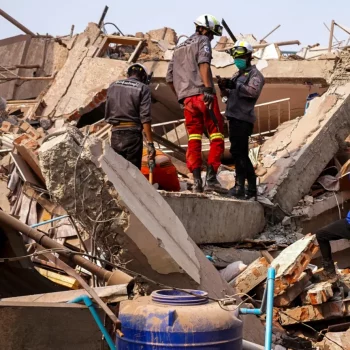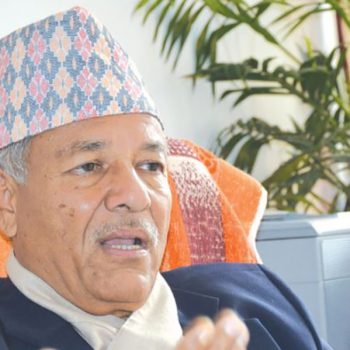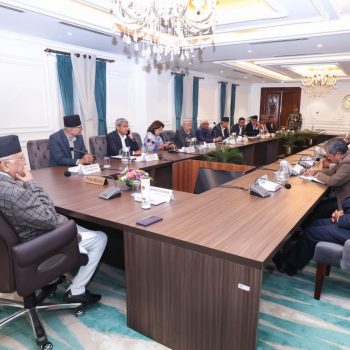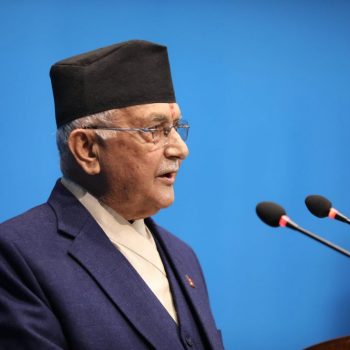‘China wants to share its development experience with all, not impose it.’

Tang Chian, Professor of Economics at Leshan Normal University in Leshan City, Sichuan Province, China, has carried out an in-depth study of the Chinese and world economies. She is also the Dean of the Economics Department at the University. She is well aware of the economic development and practices of South Asian countries including Nepal, and believes that the more cooperation there is between China and South Asia, the easier it will be for overall socio-economic progress. Professor Tang, who is closely monitoring the development process and economic activities of Nepal, was interviewed by a Nepali Professor, Dr. Buddhi Prasad Sharma, who is studying at Leshan Normal University.
How do you analyze Nepal-China relations in historical and current contexts?
Nepal and China are among the oldest countries in the world. The two countries have enjoyed cordial relations since time immemorial. The history of knowledge, culture, trade, and other exchanges is very old. Due to this, mutual trust and cooperation between the people of the two countries have been strong. Both countries have been cooperating with each other in difficult times. Looking at the history of the founding of the People’s Republic of China in 1949 under the leadership of Chairman Mao Zedong, there has been a recorded significant increase in relations, deep co-operation, exchanges, and trust.
As the birthplace of Lord Buddha, Nepal is a very important country for millions of Chinese Buddhists. China’s Sichuan Province also has millions of Buddhists. Nepal and China are very old friends. This relationship is further strengthened by the close ties between the people of the two countries, and it is clear that this is deepening in the current situation.
Shortly after launching its policy of economic openness, China has made remarkable progress. This progress has been praised all over the world. What can a country like Nepal learn from the experience of China’s prosperity journey?
Under the leadership of leader Tang Xiaoping, China adopted a scientific policy of reform and openness in 1978. Although many see it only as economic reform, it was in fact a broad determination to refine China in terms of political, economic, administrative, technical, and international relations to advance its overall development. Due to its scientific approach, hard work, overall initiative, and perseverance, China made progress within a short period of time and implemented socialism with Chinese characteristics.
By the end of 2020, China had completely eradicated poverty. As an economist speaking of Chinese development experience, first of all, we developed and implemented the kind of plans that were needed for China’s terrestrial reality. Second, we identified our strengths and weaknesses and implemented them accordingly in a scientific manner. Third, we took the problem as an opportunity to initiate sweeping change. Fourth, all bodies from the center to the grassroots have been equally responsible for realizing Chinese leadership and determination for its development. And fifth, as China progressed, its deepening international relations and cooperation and partnership also became strong which was instrumental in contributing to the development.
Therefore, friends like Nepal should learn a lot from the experience of China and develop a model of development based on their territorial realities, economic conditions, socio-economic environment, and be active in the implementation. China wants to share its experience with all its allies, but never wants to impose its model on other countries because every country should prepare models and policies of development and reform according to its own realities.
The Belt and Road Initiative (BRI) launched by China has received a positive response, mainly from the developing world. What and how can countries like Nepal benefit from BRI?
China is pursuing the common dream of the world by sharing its achievements with allies around the world. According to the same plan, BRI was started by President Xi Jinping. Although China launched this, it is structured in such a way that all the countries of the world share and contribute according to their needs and desires, so China believes that it is a global campaign.
BRI has adopted the principle of deep partnership in various fields including economic, technical, infrastructural, and cultural sectors. Looking at the cooperation and partnership that has progressed under BRI in a short period of time, it can be understood that the international community has embraced it and accepted that it is in the interest of the world to move forward through partnership and networking.
As BRI lays the groundwork for bilateral, regional, and international cooperation, countries like Nepal can reap huge benefits for their socio-economic progress. They can benefit according to the national need by attracting investment, introducing new technology, exchanging knowledge and skills, expanding trade, tourism, and many other areas. Another important point is that as all these plans move forward according to the needs, capabilities, and desires of the countries concerned, they can reap long-term benefits.
For a landlocked country like Nepal, it serves as a bridge to move forward by cooperating more effectively with the international community. Since Nepal and China reached an agreement to partner under BRI in 2017, work on some projects has progressed and many projects are in the process of moving forward.
How does China want to share its miraculous economic development achievements with the world community?
China certainly wants to contribute to addressing the world’s common problems and challenges by sharing its development and prosperity with the world community in a generous manner. For the past three decades, China has not participated in any kind of war. As a responsible member of the world community, we want to contribute as much as possible by moving forward on the path of peaceful development.
China is committed to doing its part to fulfill the common dream of the world. At the same time, China has reached out to every corner of the world and pushed for cooperation. With major trade partnerships with most of the world’s major countries, China has moved ahead in terms of people-to-people and in-depth cultural exchanges.
No one should be intimidated by China’s development. China is ready to make the maximum contribution to peace, stability, and development in the world by enhancing partnership through peaceful development.
What else do you think should be done to increase cooperation between Nepal and China in the field of education?
Looking at the educational exchanges and cooperation between Nepal and China over the years, it seems that a lot can be expected. Currently, thousands of Nepali students are studying in various universities in China. Nepali students are considered to be very hardworking, talented, and disciplined in China. Nepali scholars are working in many Chinese universities and think tanks.
The variety of educational exchanges has increased a lot since Chinese students have also started going to Nepal to study. This situation also highlights the growing people-to-people ties between the two countries. China wants more Nepali scholars to come to China and be active in research for friendship to be strengthened. In order to increase this kind of cooperation in the future, in my opinion, in-depth exchanges on both sides, a partnership between universities and think tanks, cooperation in research, regular exchange of knowledge and technology, and various levels of educational cooperation should be enhanced.
What should be done in the future to further strengthen the people-to-people and cultural exchanges between Nepal and China?
Nepal and China are neighboring countries with old civilizations. That is why the history of people-to-people and cultural exchanges between the two countries is very long. This relationship is based on trust, cooperation and reconciliation. When the catastrophic earthquake hit Nepal in 2015, China immediately extended a helping hand and conveyed the message that they support their friend in difficult times. Since the establishment of formal diplomatic relations between Nepal and China in 1955, China has been providing regular assistance to Nepal’s socio-economic development.
At present, China is Nepal’s major investor and second-largest trading partner. China wants stability, peace, and development in Nepal, for which it is ready to provide all kinds of assistance according to Nepal’s needs. In order to make the relationship more profound, trust-based, and long-lasting, people-to-people and cultural ties must be deepened.
For this, we have to move forward by making more new equations as per the need. As the beautiful country of Nepal is a very attractive destination for Chinese tourists, publicity and activism should be increased to take advantage of it.
Nepal is implementing the program of prosperous Nepal, even though there are complaints that the development process has been very slow. What concrete suggestions would you like to make for Nepal to achieve rapid economic growth?
Nepal is a very beautiful country. It is also rich in natural resources. From the point of view of an economist, my view is that Nepal should decide the model of development according to its terrestrial realities. One has to learn from the progress and practice of others, but in one’s own country, one also has to decide the method and approach according to the needs and realities of themselves. When this happens, it becomes easier to implement and citizens begin to experience real change. Secondly, Nepal should accelerate investment and development in areas that are comparatively more lucrative by attracting domestic and foreign capital. For this, important issues like necessary political commitment, administrative agility, and legal simplification should always be prepared.
If the confidence of the people that something good is happening in the country grows, they will increase their efforts many times over. Nepal must promote tourism by building the necessary infrastructure. Even if Nepal can import a significant amount of tourists from China and India, Nepal can reap substantial benefits. Similarly, if Nepal can act as a bridge connecting China and South Asia, the country will become powerful in the long run.
China is always ready to assist in the development process as per Nepal’s wishes. Chinese companies are very keen to invest in Nepal. During President Xi’s visit to Nepal, various important understandings have been made through co-operation. I hope that Nepal will soon achieve its development goals with solid commitment and implementation.









